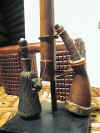XHOSA
- The Xhosa were the earliest southern Nguni to migrate to their present
area.
- The Xhosa claim
descent from a (possibly mythical) common ancestor, Xhosa, who was said to
have ruled in the 1530s, but the true origin of the Xhosa is unknow. Maybe
the process of centralisation among the Xhosa began somewhere between the late
16th and late 17th centuries. As the whites expanded into the Eastern Cape the
first southern Nguni they encountered were the Xhosa and they then applied
this term to all southern Nguni, in spite of differences.
- They gave a
greater importance to cattle and they supplemented their diet with coastle
produce as sugar, pumpkins, bananas, and smoked dagga (marijuana), for
probably the best marijuana in the world grows easily in the Eastern Cape.
Although the Nguni did not mine any metals they were able to obtain what they
required by selling their agricultural products, particularly dagga, to other
Bantu groups or to whites.
- The Nguni
languages bore a deep khoi influence: of 55 Xhosa consonants 21 are traceable
in Khoi languages. Even the self-name of the Xhosa derives from the Khoi term
"angry man": another rendition is that Xhosa means "to
 destroy".
destroy".
- During the 18th
century the Xhosa absorbed the Khoi both as clients and by intermarriage, but
some khoi groups opposed the Xhosa and cooperated with the whites. Nguni had
relation also with the San: in fact they sold cattle and dagga to the San in
exchange of ivory. In the same century Xhosa fought several internal wars over
the sucession. Part of them sought alliance with the growing power of the
whites. This move opened the way to a very different drama with
powerful new players: the era of colonial conquest was now to begin.
 destroy".
destroy". destroy".
destroy".